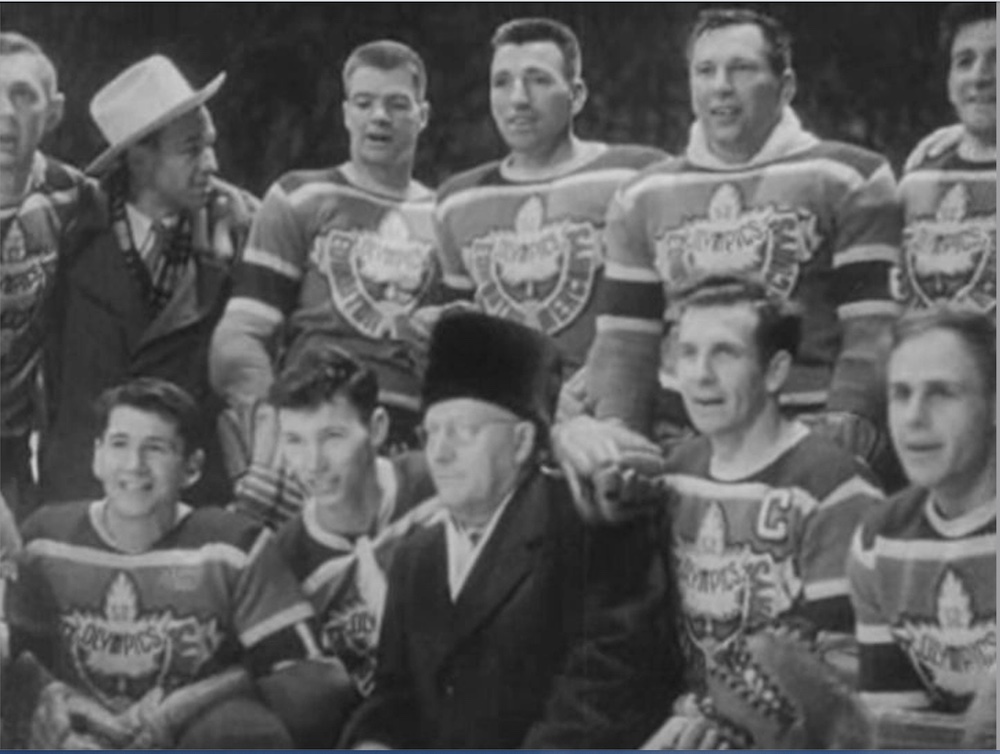On February 24, 1952, the Edmonton Mercurys completed an undefeated run through the Winter Olympics in Oslo, Norway, to win the gold medal in hockey. Canada had previously won Olympic hockey gold in 1920, 1924, 1928, and 1932, and after settling for a surprising silver behind a Great Britain team loaded with Canadian-born players in 1936, won gold again in 1948 when the Olympics resumed after World War II. With the Soviet Union entering the Olympic scene in 1956, Canadian men wouldn’t win Olympic hockey gold again after 1952 for another 50 years until the star-studded NHL team at the 2002 Winter Olympics in Salt Lake City.
Though Canada no doubt deserved its gold medal in 1952, the win wasn’t without controversy. After scoring victories of 15-1 over Germany, 13-3 over Finland, 11-0 over Poland, 4-1 over Czechoslovakia, 11-2 over Switzerland, 3-2 over Sweden, and 11-2 over Norway in its first seven games, Canada managed only a 3-3 tie with the Americans in the finale for both clubs. Had Canada won the game, the United States would have finished fourth. With the tie, the U.S. claimed silver and a newspaper in Moscow accused the two North American countries of colluding to deny the Czechs (who would finish fourth) a medal.

Canadian fans, of course, have long accused Soviet and Russian teams, and European authorities, of similar shenanigans in international competition. But while there likely hadn’t been a fix in Oslo, European teams — as they often would — sharply criticized the Canadian and American hockey teams for their rough tactics. This would have a surprising result on Olympic and sports history.

At the Summer Games in London in 1948, Czechoslovakian long distance runner Emil Zatopek won a silver medal in the 5,000 meters and gold in the 10,000. He improved on that performance in Helsinki in 1952 and shortly after those Summer Olympics concluded, Zatopek claimed that the rough play in hockey (and perhaps the way his countrymen had been denied their medal) earlier that year was indirectly responsible for his record-breaking feats in Finland.
“It was the brutal and harsh play of the United States ice hockey team which drove me to my most recent performances,” said Zatopek in a story widely reported in North American newspapers on August 16, 1952. “I made a pledge to win at least two gold medals for my country.”

Not only did Zatopek win gold in the 5,000 and 10,000 meters in Helsinki, he made a last-minute decision to enter the marathon for the first time in his life … and won the gold medal in that race too! He is the only man ever to win all three races in the same Olympic Games.

Zatopek fell out of favour with the Communist party in Czechoslovakia after the Prague Spring of 1968, but was finally “rehabilitated” in 1990. He died in Prague on November 22, 2000 at the age of 78 and became one of the first twelve athletes named to the IAAF Hall of Fame in 2012. Zatopek was selected as the Greatest Runner of All Time by Runners World Magazine in 2013.
But if it hadn’t been for some chippy hockey back in February of 1952, who knows what might have happened…
What a fascinating bit of Olympic history. Thank you Eric.
No doubt chippy play and questionable sportsmanship motivated many an athlete in games against Canada and USA but when one has just garnered 3 Olympic golds in response, it does reinforce just how much the athlete disliked what they saw.
Three golds…including one in a gruelling race he had never run before…WOW!
Thanks for sharing.
Eric at his very best. What a wild story and I had never heard a thing about it.
Thanks, Eric.
Glad that you hadn’t heard it either! I certainly hadn’t, and thought it was interesting … but did wonder if it was a story other people knew.
I am happy for Zatopek winning, however, I am more pleased that as a sports figure he was not afraid to speak out against what he considered injustice.
Thanks for another good read.
Great discovery, Eric. I was aware of the chippy play criticism at the time, I think I’ve got an ancient NY Times clipping about it in my files, but the rest concerning the Z man was news to me.
Great story Eric. I was always very interested in long distance runners and especially someone like Zatopek because of his ability to be a multi gold medalist. Fascinating to hear what motivated him.
It’s amazing what motivates another human being. Coaches that overmanipulate tend to have great success and then burnout.
But there’s probably an inherent lesson for all of us in that story about being cognizant of our actions because one never knows what the reactions are going to be.
Great story! First for me as well.
More interesting information!
Thanks.